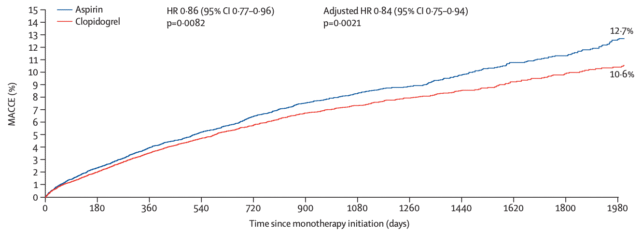A common way to manage coronary heart disease is coming under question. To prevent a repeat heart attack or stroke, many patients of a certain age are currently advised to take low-dose aspirin each day, indefinitely.
Emerging evidence suggests a better option already exists.
A recent meta-analysis by an international team of cardiologists finds that clopidogrel – which stops blood platelets from clumping – is a superior choice to aspirin in the long run for patients with established coronary artery disease.
The oral drug works among various age groups, ethnicities, sexes, and body sizes, and it’s highly effective at ‘thinning’ the blood.
Related: A Shocking Number Still Don’t Know The Risk of Taking Aspirin Each Day
Compared to aspirin, clopidogrel lowers the risk of a future heart attack, stroke, or cardiovascular death by roughly 14 percent, and importantly, it does so without increasing the risk of excessive bleeding.
The drug was only tested as a secondary treatment, which means it prevents major cardiovascular events in those who have already suffered a heart attack or stroke.
“These findings support the consideration of clopidogrel as the preferred long-term anti-platelet strategy instead of aspirin in patients with established coronary artery disease,” the authors conclude, led by Ki Hong Choi of Sungkyunkwan University in South Korea and Marco Valgimigli of the Cardiocentro Ticino Institute in Switzerland.

Clopidogrel (often sold under the brand name Plavix) is frequently used as a short-term treatment after heart attacks or strokes. In 2023, it was counted among the top 50 most commonly prescribed medications in the United States.
The American Heart Association (AHA) currently advises that patients with peripheral artery disease – outside the heart or brain – take clopidogrel instead of daily aspirin, as it is more effective at preventing major vascular events.
But even though some recent trials suggest that there are benefits for coronary artery disease as well, clopidogrel is generally only recommended if a patient can’t take aspirin for whatever reason.
The data behind that advice is outdated, argue some cardiologists.
“[T]he body of evidence that has supported the long-term use of aspirin monotherapy for decades is largely based on small studies performed before the advent of modern pharmacotherapies and revascularization strategies,” write the authors of the recent meta-analysis.
The researchers compiled all the relevant randomized trials they could find comparing clopidogrel to aspirin, selecting seven studies that collectively cover nearly 29,000 patients in total.
Roughly half of the participants received clopidogrel as a monotherapy treatment for coronary artery disease, while the other half received aspirin.
After more than five years of follow-up, those who were taking clopidogrel were less likely than those taking aspirin to experience major adverse cardiovascular or cerebrovascular events.
Even individuals with East Asian ancestry, who tend to be less affected by short-term clopidogrel treatment, had better outcomes on clopidogrel compared to aspirin.
“To the best of our knowledge, clopidogrel monotherapy is the only anti-platelet treatment that has consistently demonstrated greater efficacy than aspirin without compromising safety,” the team writes.
Choi, Valgimigli, and their colleagues aren’t the only cardiologists who think there may be better options out there than aspirin.
In a 2020 review article, published in the AHA journal, Circulation, cardiologists at Johns Hopkins University, Harvard University, the Massachusetts General Hospital, and the National University of Ireland Galway called for further research.
The role of aspirin in the early treatment of a heart attack is well-established, the team admits, but when studies on daily aspirin and cardiovascular disease were conducted in the 1970s and 1980s, the trials didn’t follow up with patients for very long, and many did not use low-dose aspirin.
Nevertheless, this is the data that today’s guidelines are largely based on. Patients who are concerned about their current courses of treatment are encouraged to discuss their options with medical specialists before making any changes.
It may be time to reassess the risks and benefits of low-dose aspirin, especially among older folk at higher risk of bleeds. Clopidogrel is waiting in the wings.
The study was published in The Lancet.
Source link

